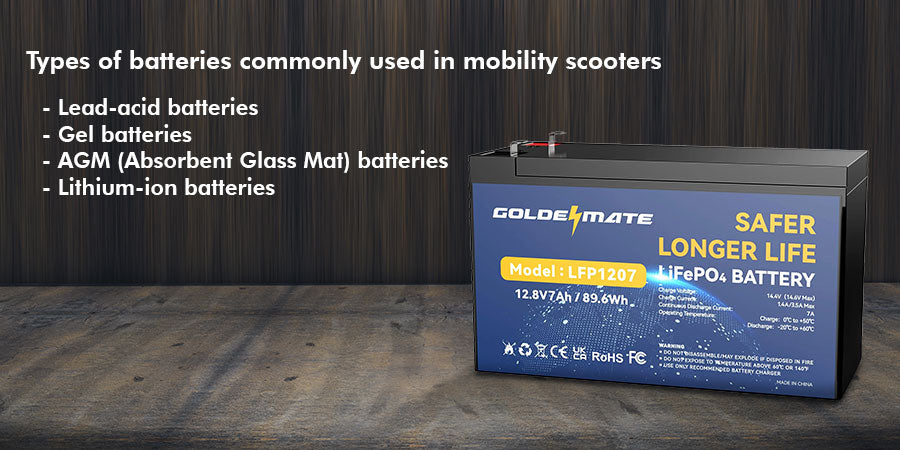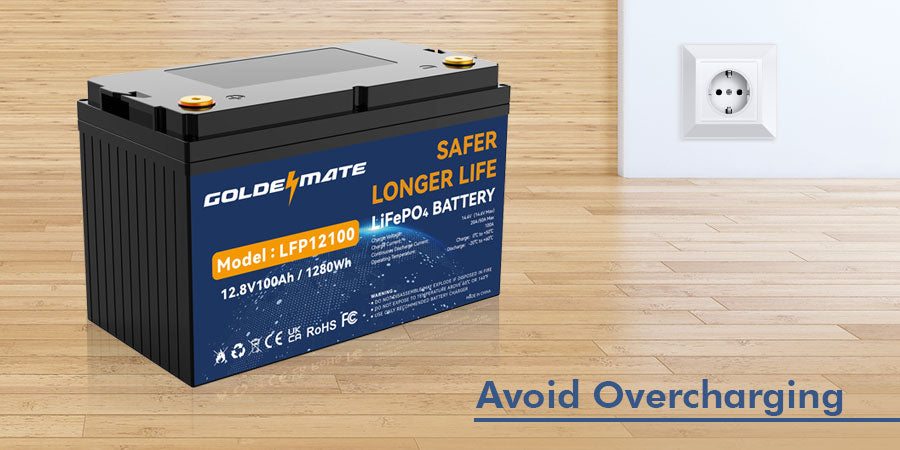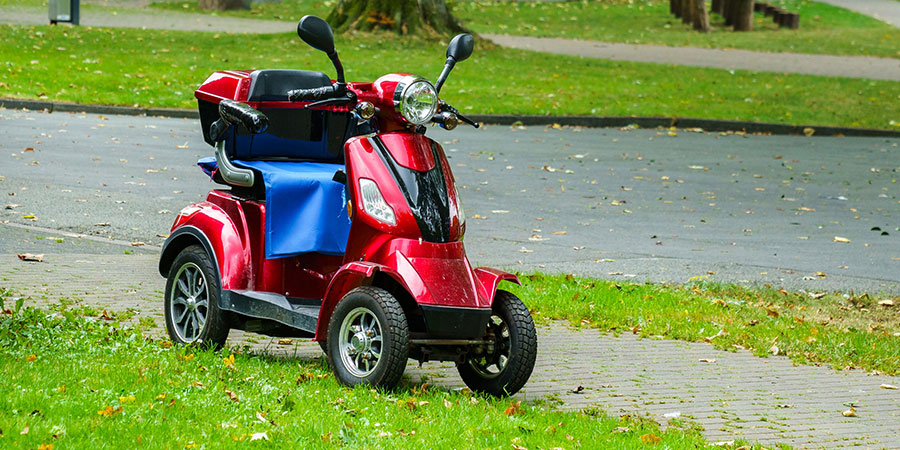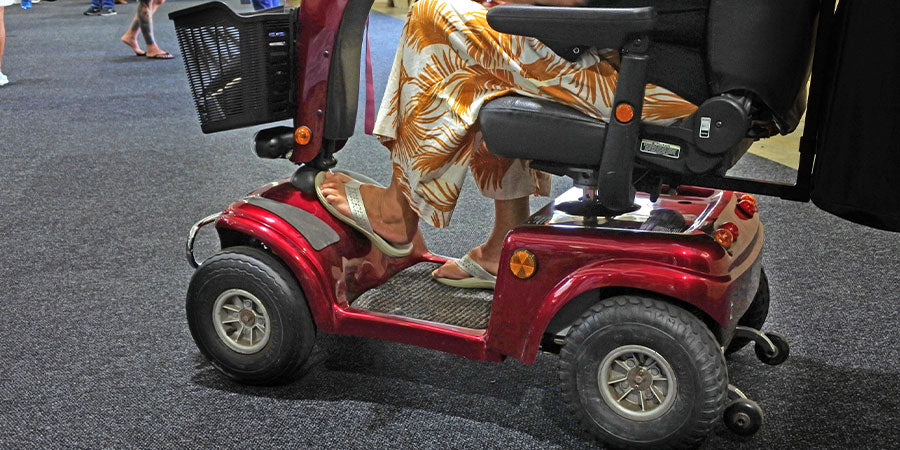A mobility scooter is a vehicle that allows people with limited mobility to get around. These convenient scooters use rechargeable batteries to power their motors and electronics. The type of battery and how long it lasts directly impacts how far you can travel on a single charge. Having a reliable battery that maintains its charge is important. It'll ensure your mobility scooter can go the distance when you need it. In this article, we'll explore the different battery types used in mobility scooters. We'll also discuss the factors that determine their lifespan. We'll also share tips to help you get the most out of your scooter's batteries so you can keep cruising worry-free.
Understanding Mobility Scooter Batteries
Mobility scooters run on rechargeable batteries. These batteries provide the power to make the scooter move. Mobility scooters use different types of batteries. The type of battery affects how long it lasts and how well it performs.
Types of Batteries Commonly Used In Mobility Scooters
Lead-Acid Batteries
The most common battery is the lead-acid battery. These are affordable options for mobility scooters. Lead-acid batteries need some maintenance to keep working well. They don't last as long as newer battery types. But they get the job done at a low cost.
Gel Batteries
Gel batteries are sealed units. They don't need much maintenance from you. These batteries cost more upfront than lead-acid. However, gel batteries tend to last longer before needing replacement.
AGM (Absorbent Glass Mat) Batteries
AGM batteries work similarly to gel batteries. However, they use a different material to absorb the battery acid. These batteries resist leaking if tipped over. They can also better withstand vibrations from riding. AGM batteries have a longer lifespan compared to lead-acid.
Lithium-Ion Batteries
Lithium-ion batteries are the newest battery technology. These are very lightweight and require hardly any maintenance. Lithium-ion batteries can last a very long time with proper care. But they have the highest upfront cost of all battery types.
Want to upgrade to a long-lasting, high-performance battery? Check out our lithium mobility scooter batteries! Lithium batteries deliver extended range and runtimes. It's the premium battery choice for active users.
Basic Components of A Mobility Scooter Battery
Inside every mobility scooter battery are multiple small battery cells. These cells are connected as a pack. Having more cells increases the battery's total power capacity. This connection allows the scooter to run longer on one charge.
Overview of Battery Lifespan Expectations
How long a mobility scooter battery lasts varies a lot. With proper care, lead-acid batteries may last 1-2 years. Gel and AGM batteries can go 2-3 years typically. The longest-lasting are lithium-ion batteries at up to 5 years or more. However, many factors affect the actual usable lifespan.

Factors Affecting Mobility Scooter Battery Lifespan
There are a few factors that affect the lifespan of batteries. Let's explore some of them.
Usage Patterns
How you use your mobility scooter impacts battery life. Riding the scooter frequently will drain the battery faster. Taking the scooter on longer trips also uses up more battery power quickly. Using energy-saving modes can help reduce drain.
Charging Habits
Proper charging is very important for batteries. Overcharging by leaving it on the charger too long can damage the battery cells. Undercharging by not fully recharging also causes issues. Following the manufacturer's charging guidelines is best.
Environmental Conditions
Hot or cold temperature extremes are hard on batteries. Very hot temperatures can cause batteries to overheat and fail sooner. Extremely cold temperatures reduce the battery's charge capacity. Moisture and humidity can also lead to corrosion issues.
Maintenance and Care
Giving your battery some basic maintenance goes a long way. Keeping the battery terminals clean prevents excessive drain. Checking for cracks, leaks or bloating lets you replace a failing battery early. Proper storage when not using the scooter also helps batteries last.
Quality of the Battery
Not all batteries are created equal. Higher-quality batteries from reputable brands tend to last longer. While they cost more upfront, a better battery pays off with improved longevity and performance over cheaper options.

Estimating Battery Life Expectancy
Knowing roughly how long your mobility scooter's battery will last is helpful for planning. There are a few different ways to estimate the remaining lifespan.
Manufacturer Specifications
Battery manufacturers provide an estimated lifespan rating. This shows how long the battery should theoretically last under normal conditions. However, real-world usage may vary.
Real-World Considerations
In actual use, several factors affect battery life beyond the manufacturer's estimate. Usage habits, charging routines, and environmental conditions play big roles. The estimated lifespan is simply a guideline.
Average Mileage Per Charge
Tracking how many miles you can travel on a single battery charge is useful. As batteries age, this mileage range will gradually decrease over time. Once it drops significantly, the battery is nearing the end of its life.
Duration of Usage Before Recharging
Similarly, note how long the scooter can run before needing a recharge when new. Then compare that time as the battery gets older. A drastic reduction shows that it's almost time for a replacement.
Want to get the most out of your mobility scooter? Upgrade to our long-lasting, high-performance Goldenmate 12V 20Ah LiFePO4 Lithium Battery! This battery offers superior performance and protection with 4000+ cycles and 10 10-year lifespan. It has a built-in 20A BMS for multiple safeguards. This lithium battery takes your mobility to new levels.
Signs Indicating Declining Battery Performance
The battery will show physical signs that it is wearing out over time. You may notice the battery case bloating or swelling up. There could be corrosion buildup on the battery terminals. Sometimes batteries develop cracks and start leaking. The battery may also struggle to hold a full charge as it gets older. If you notice any of these issues, it means the battery is failing. You should replace the battery soon when you see these signs.

Tips For Prolonging Mobility Scooter Battery Life
Taking good care of your mobility scooter's battery is important. By following some simple tips, you can make the battery last longer. This way, you won't have to replace it as often.
Proper Charging Practices
Always charge the battery the right way. Read the instructions from the manufacturer carefully. Using the wrong charger or not charging correctly can damage the battery over time. Set up a routine for when you charge the battery.
Avoiding Overcharging
Let the battery charge until it's full, but don't leave it on the charger too long after that. Overcharging can damage the battery cells and make the battery get old faster. Unplug the battery when it's done charging.

Regular Charging Intervals
It's best to charge your battery often, even if you only use a little bit of power. Don't wait until the battery is completely drained before charging it again. Charging it regularly helps the battery last longer.
Storage Considerations
If you're not going to use your mobility scooter for a while, you need to take some extra steps with the battery.
Ideal Storage Conditions
Find a cool, dry place to store the scooter and battery. Avoid very hot or freezing temperatures. Also avoid moisture and humidity, as these can damage the battery.
Preventing Battery Drainage During Storage
Make sure the battery is fully charged before storing it. You can also disconnect the battery from the scooter to prevent it from losing power slowly over time.
Maintenance Routines
Developing a simple maintenance routine can help your battery last longer.
Cleaning Terminals
Use a tool to clean off any corrosion on the battery terminals regularly. This ensures a good, solid connection between the battery and the scooter.
Checking For Leaks Or Damage
Check the battery case every so often. Look for cracks, swelling, or leaks from the inside materials.
Periodic Inspections and Replacements
Have a professional inspect and test your mobility scooter batteries once a year. Replace them when their performance gets much worse.
Environmental Precautions
Here are some environmental factors to look out for if you want to prolong your battery's lifespan.
Temperature Management
It's important to protect your mobility scooter battery from extreme temperatures. Very hot or freezing cold conditions can damage the battery and cause it to stop working properly before its time. Whenever you can, try to avoid exposihe battery to these harsh temperature extremes.
Protection Against Moisture and Extreme Weather Conditions
Keep batteries dry and sheltered from rain, snow, humidity, and other moisture sources. Wetness can cause corrosion and damage.

Upgrading Options For Enhanced Battery Performance
If you need longer run times or more power from your mobility scooter, upgrading the battery can help. New battery options provide improved performance.
Consideration of Battery Types
Look at the different battery types to decide which works best. Lithium-ion batteries offer the highest capacity and longest lifespan. Gel or AGM batteries also provide better performance than basic lead-acid.
Technological Advancements In Battery Technology
Battery technology continues advancing to make batteries lighter, longer-lasting, and more powerful. Manufacturers regularly release new, improved battery models with the latest innovations.
Compatibility With Existing Mobility Scooter Models
Before purchasing a new battery, confirm it is compatible with your specific mobility scooter model. Using an incompatible battery could damage the scooter's electrical system.
Speak with the manufacturer or retailer to ensure the upgraded battery will work correctly with your scooter. In some cases, you may need to also upgrade other scooter components.
While new batteries have higher upfront costs, they can improve your scooter's range. Take advantage of better battery choices when it's time for a replacement.

Conclusion
We covered a lot about mobility scooter batteries! The right battery and proper care are key to keeping your scooter running smoothly. Remember to choose a quality battery type that fits your needs. Follow charging routines and maintain the battery regularly. This will extend its lifespan and performance.
Avoid extreme temperatures and protect the battery from moisture. Be aware of signs that the battery is wearing out, like reduced range. Replace old batteries promptly when needed. With some simple maintenance habits, your mobility scooter's battery will provide power for years.
Want to learn more about upgrading to a premium lithium mobility scooter battery? Visit Goldenmate to explore our full selection of high-performance lithium options. Our lithium batteries keep you moving further with less hassle. Check out our site today to find the perfect lithium upgrade for your needs.


















